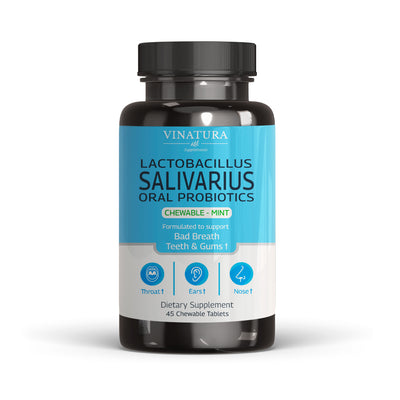
Does Lactobacillus Gasseri Benefit for Constipation?
Constipation is a common digestive problem affecting people of all ages, causing discomfort and impacting life quality. Some studies suggest that Lactobacillus Gasseri, a natural bacterium, helps alleviate constipation.
This article will explore scientific research on the benefits of Lactobacillus Gasseri for constipation and how to use it safely to improve effectiveness.
Before exploring further, please read the disclaimer located at the end of this webpage.
Key Takeaways
- Lactobacillus Gasseri offers several benefits to digestive and gut health, such as preventing stomach ulcers, improving diarrhea conditions, increasing the amount of Bifidobacteria in the gut microbiota, and promoting a balance of microflora.
- Lactobacillus Gasseri benefits constipation by reducing harmful bacteria (Prevotella), enhancing beneficial bacteria, decreasing colon pH, and stimulating colonic motility.
- Lactobacillus Gasseri can be supplemented through fermented foods like yogurt, sauerkraut, kimchi, or dietary supplements. It's advisable not to use L. Gasseri simultaneously with antibiotics.
- Pregnant women, nursing mothers, recent organ transplant patients, and those allergic to dairy should consider carefully before supplementing with L. gasseri products.
- Maintaining a fiber-rich diet, drinking plenty of water, regular bowel movements, and frequent exercise can help alleviate constipation.
Understanding Constipation
Constipation is a health issue related to bowel movements, where a person cannot defecate regularly (less than three times a week) or struggles during defecation.
Constipation remains a common digestive issue, with over 2.5 million doctor visits annually and about 4 million people in the United States experiencing frequent constipation.
What Causes of Constipation

First, let's explore the mechanism behind the formation of feces in the body. As food moves through the colon, the colon absorbs water from it. Subsequently, muscle contractions push the stool toward the rectum.
By the time it reaches the rectum, most of the water has been absorbed, making the stool dry, hard and difficult to pass.
This mechanism points to several causes of constipation, such as a lack of fiber, inadequate water intake, unhealthy eating habits and lifestyle, and lack of exercise.
Additionally, changes in living conditions (like pregnancy, travel, and aging) or the effects of medications, especially the misuse of laxatives, can lead to constipation.
Symptoms of Constipation
Constipation sufferers often experience symptoms such as defecating less than three times per week, hard, dry, lumpy stool, difficulty passing stools, and pain during bowel movements.
They may also feel bloated and nauseous, suffer from abdominal pain and cramps, and have a sensation that not all stool has been passed after going to the toilet.
What are the Benefits of Lactobacillus Gasseri for Digestive Health and Gut Health

Lactobacillus Gasseri is a probiotic bacterium belonging to the Lactobacillus family.
It's naturally found in the digestive and urinary tracts, inhibiting harmful bacteria, breaking down food, and absorbing nutrients. These bacteria can be found in fermented dairy foods or supplements.
Lactobacillus Gasseri offers significant health benefits, particularly for digestive and gut health.
It has been shown to prevent stomach ulcers by reducing Helicobacter pylori infections and improving diarrhea conditions [1].
Additionally, L. gasseri benefits patients with irritable bowel syndrome (IBS), helping control ulcerative colitis inflammatory bowel disease (IBD) [2] and significantly increasing the amount of Bifidobacteria in the gut microbiota, a well-known beneficial bacterium that improves bowel movement, supports immune health, and promotes regular defecation [3].
Although individual research evidence on L. gasseri is limited, its ability to modulate the gut microbiota cannot be denied.
Several studies also indicate that Gasseri regulates the balance of gut microbiota, controlling the risk of being overweight [4].
The Science Behind Lactobacillus Gasseri and Constipation
In a study conducted by supplementing probiotic-fermented yogurt containing Lactobacillus Gasseri to Kunming mice with constipation [5], it improved the secretion of GI-regulating peptides in serum and neurotransmitter substances, increased the expression of c-kit and SCF proteins, meanwhile adjusting the structure of gut microbiota and SCFA levels.
Additionally, L. Gasseri facilitated bowel movements, reduced the presence of harmful bacteria, Prevotella, and increased the abundance of beneficial bacteria such as Lactobacillus, Oscillospira, Ruminococcus, Coprococcus, and Akkermansia.
Gasseri could contribute to developing functional foods to improve human gut health.
A study was conducted to ensure the use of probiotics, including L. gasseri, to manage constipation.
It demonstrated its effectiveness in reducing the transit time through the colon, decreasing intestinal pH, and thereby enhancing colonic movement, which is beneficial for patients with constipation [6].
How to Use Lactobacillus Gasseri for Constipation

As discussed above, Lactobacillus Gasseri is a beneficial bacterium found in the gut, known for improving digestion and reducing constipation. How, then, should Lactobacillus Gasseri be used to treat constipation?
Currently, L. gasseri is widely available in various functional foods. Depending on the specific product, you can supplement L. gasseri in capsules, tablets, or powder with the recommended dosage. However, the human body requires 1 to 10 billion colony-forming units (CFU) daily.
Also, remember to include yogurt in your diet. Yogurt is a fermented milk product with microorganisms containing Lactobacillus Gasseri, suitable for daily consumption.
Other fermented foods like sauerkraut, kimchi, tempeh, or whole grains, fruits, and vegetables also provide a good source of Lactobacillus Gasseri while also supplying prebiotics - a type of fiber that feeds beneficial bacteria in the gut.
Dosage and Recommendations You Need to Know about Lactobacillus Gasseri for Constipation
There is no specific recommended dosage for Lactobacillus Gasseri. The strength of Lactobacillus supplements is often expressed in colony-forming units (CFU), an indicator identifying the number of living organisms per capsule or tablet.
The human body requires 1 to 10 billion colony-forming units to maintain and stabilize the gut microbiota balance.
Carefully read the ingredients list of each supplement product, or consult a doctor or healthcare professional to determine the appropriate consumption method and dosage.
Note that antibiotics can reduce the effectiveness of probiotic supplements.
Therefore, avoid using them simultaneously or space probiotic doses about 2 hours apart from antibiotics to achieve the best effect [7].
Potential Side Effects and Precautions When Taking Lactobacillus Gasseri

No specific study has proven the short-term or potential side effects of Lactobacillus Gasseri supplements.
In some cases, L. gasseri could cause bloating and abdominal distention. However, most occur mildly and result from the body's adaptation mechanism.
Though not potentially harmful in side effects, when supplementing with Lactobacillus Gasseri, consider a few issues to prevent undesirable consequences:
- There's no definitive confirmation about the absolute safety of L. gasseri during pregnancy or lactation. Consult a doctor or gynecological expert to fully understand the benefits and risks before using probiotics during this stage.
- Probiotic products are generally not recommended for individuals with compromised immune systems, HIV infections, those who have undergone organ transplantation, or those undergoing cancer treatment with immunosuppressive drugs.
- Some L. gasseri supplement products may contain traces of milk protein, so those with milk allergies should take caution.
- L. gasseri bacteria could overgrow if the immune system is compromised, potentially causing heart and heart valve infections, so consult a healthcare professional before using probiotics.
Other Natural Remedies for Constipation
Lifestyle, activities, and diet greatly influence constipation.
To prevent constipation, besides supplementing with beneficial bacteria like Lactobacillus Gasseri, maintain a diet rich in fiber from vegetables, fruits, whole grains, or legumes. Fiber retains water in the stool, facilitating more effortless bowel movement.
Additionally, drink at least 2 liters of water daily, exercise regularly, limit alcohol, caffeine, and laxatives, eat complete meals, allocate time for defecation, and apply massage therapies to support the digestive system.
Conclusion
Constipation not only causes discomfort to the body but also affects daily life and activities.
With the information provided above, hopefully, you have found accurate answers to the question: Does Lactobacillus Gasseri Benefit from Constipation?
Simultaneously understand this condition's mechanism, causes, symptoms, and remedies.
References
- [1] Selle, Kurt, and Todd R. Klaenhammer. "Genomic and Phenotypic Evidence for Probiotic Influences of Lactobacillus Gasseri on Human Health." FEMS Microbiology Reviews, vol. 37, no. 6, 1 Nov. 2013, pp. 915–935, academic.oup.com/femsre/article/37/6/915/554287, https://doi.org/10.1111/1574-6976.12021. Accessed 29 Sept. 2021./li>
- [2] Kentaro Nobutani, et al. The Effects of Administration of TheLactobacillus Gasseristrain CP2305 on Quality of Life, Clinical Symptoms and Changes in Gene Expression in Patients with Irritable Bowel Syndrome. Vol. 122, no. 1, 1 Jan. 2017, pp. 212–224, https://doi.org/10.1111/jam.13329. Accessed 23 May 2023./li>
- [3] Sugawara, Tomonori, et al. "Regulatory Effect of ParaprobioticLactobacillus GasseriCP2305 on Gut Environment and Function." Microbial Ecology in Health & Disease, vol. 27, no. 0, 14 Mar. 2016, https://doi.org/10.3402/mehd.v27.30259./li>
- [4] de Moura E Dias, Mariana, et al. "Lactobacillus Gasseri LG-G12 Restores Gut Microbiota and Intestinal Health in Obesity Mice on Ceftriaxone Therapy." Foods (Basel, Switzerland), vol. 12, no. 5, 3 Mar. 2023, p. 1092, pubmed.ncbi.nlm.nih.gov/36900609/, https://doi.org/10.3390/foods12051092. Accessed 25 Apr. 2023./li>
- [5] Cheng, Shasha, et al. "The Probiotic Fermented Milk of Lacticaseibacillus Paracasei JY062 and Lactobacillus Gasseri JM1 Alleviates Constipation via Improving Gastrointestinal Motility and Gut Microbiota." Journal of Dairy Science, 1 Nov. 2023, pp. S0022-0302(23)007774, pubmed.ncbi.nlm.nih.gov/37923200/, https://doi.org/10.3168/jds.2023-24154. Accessed 17 Jan. 2024./li>
- [6] Chmielewska, Anna, and Hania Szajewska. "Systematic Review of Randomised Controlled Trials: Probiotics for Functional Constipation." World Journal of Gastroenterology: WJG, vol. 16, no. 1, 7 Jan. 2010, pp. 69–75, www.ncbi.nlm.nih.gov/pmc/articles/PMC2799919/, https://doi.org/10.3748/wjg.v16.i1.69./li>
- [7] Rodgers, Blake, et al. "Prescribing an Antibiotic? Pair It with Probiotics." The Journal of Family Practice, vol. 62, no. 3, 1 Mar. 2013, pp. 148–150, www.ncbi.nlm.nih.gov/pmc/articles/PMC3601687/./li>
- [8] Didari, Tina, et al. "A Systematic Review of the Safety of Probiotics." Expert Opinion on Drug Safety, vol. 13, no. 2, 3 Jan. 2014, pp. 227–239, https://doi.org/10.1517/14740338.2014.872627.
Author

Product Disclaimer
Including an ingredient or study does not evaluate, endorse, or recommend any Vinatura product or any third-party product. Some ingredients discussed may not be used in any Vinatura product.
The content of the articles has not been evaluated by the Food and Drug Administration (FDA) and is not intended to promote or endorse any specific product. Any products sold on this website are not intended to diagnose, treat, cure, or prevent any disease.
Opinions and Endorsements
Any claims, statements, or opinions expressed in the articles are those of the author(s) and do not necessarily reflect the views or opinions of the manufacturers of the dietary supplement products. The products sold on this website are separate from the content of the articles and are not directly endorsed or associated with the information presented here.
Liability Disclaimer
The author(s) of the articles, website, and manufacturers of the dietary supplement products do not assume any liability for any potential consequences arising from the use of the information provided in the articles. Ingredient effects, dosages, and safety vary by individual, formulation, and context; some ingredients interact with medications or may be unsuitable during pregnancy or lactation. It is recommended that individuals consult with a qualified healthcare professional before making any dietary or lifestyle changes, including the use of dietary supplements.
Product Usage
Please refer to the product labels and packaging for specific usage instructions and guidelines for the dietary supplement products sold on this website.
Customer Support
For any concerns or questions regarding the dietary supplement products, please contact our customer support team, who will be more than happy to assist you.





Leave a Comment
Be the first to comment.
What do you think?